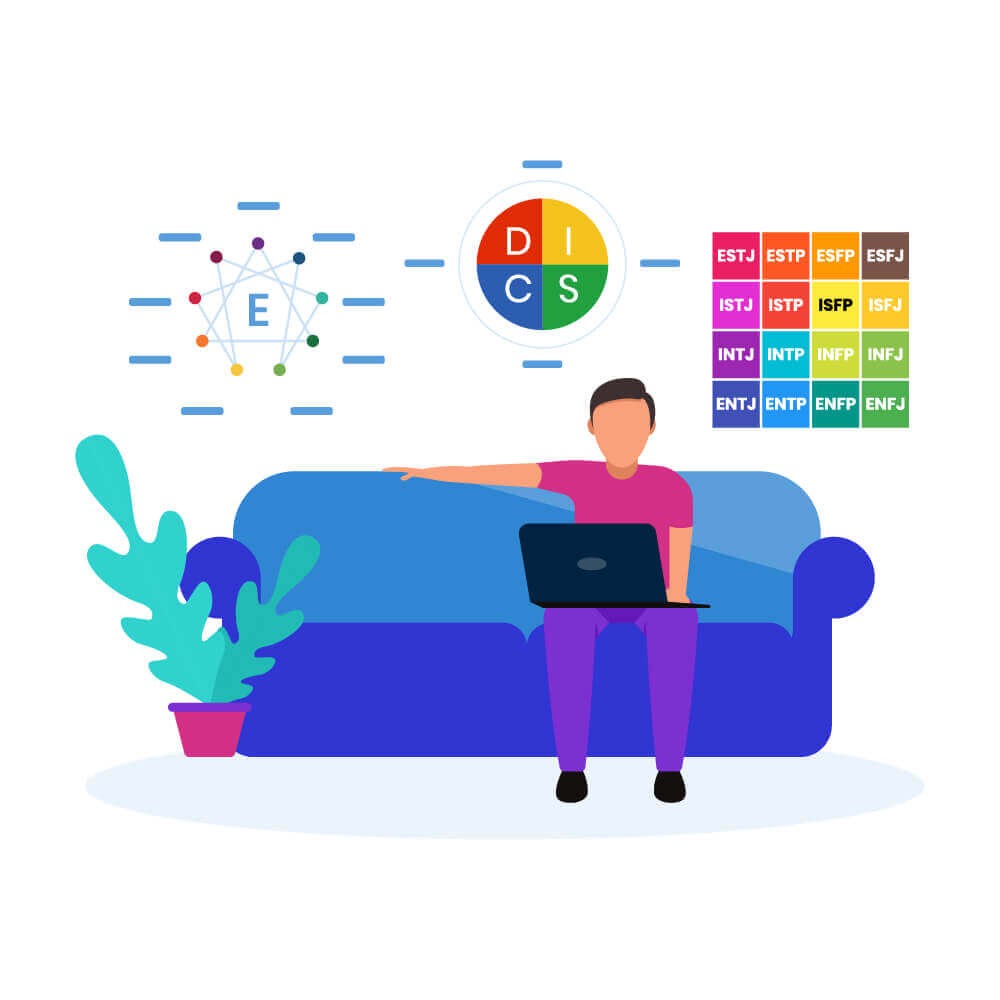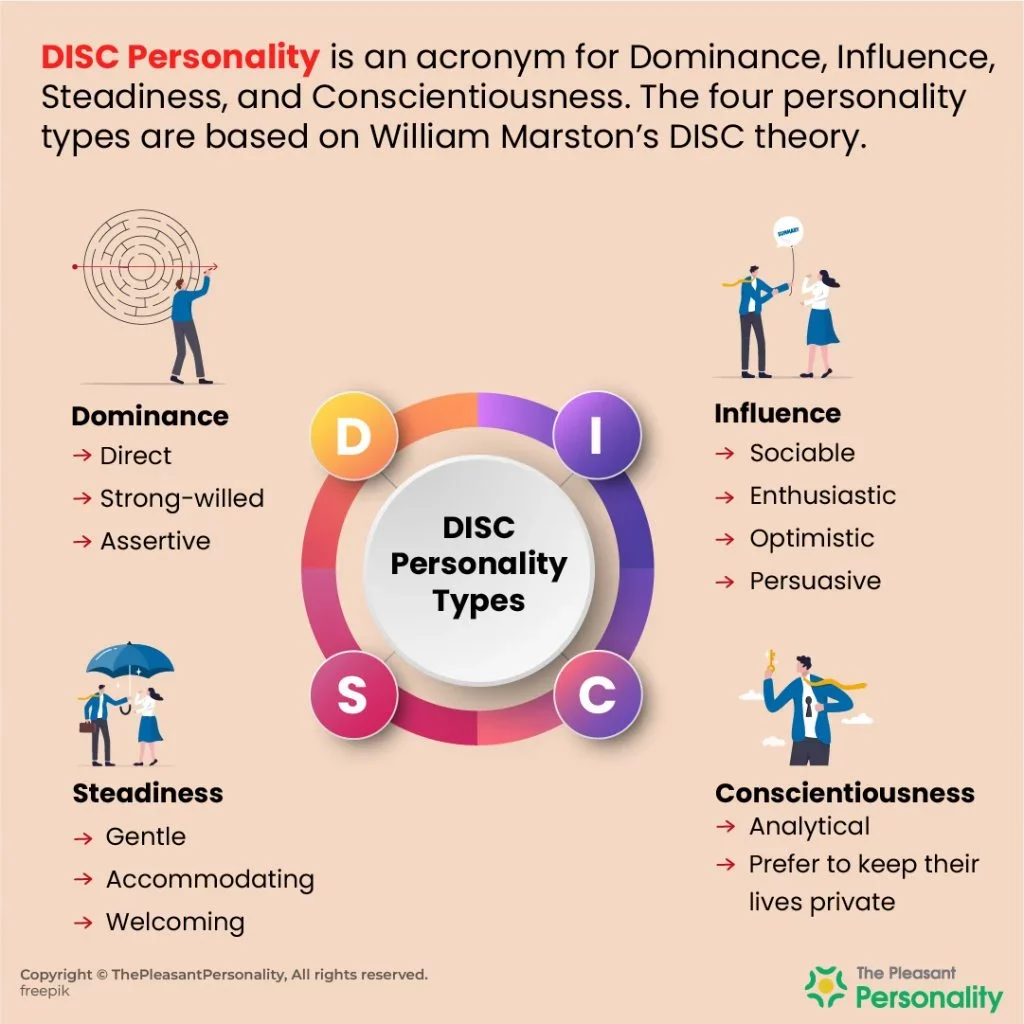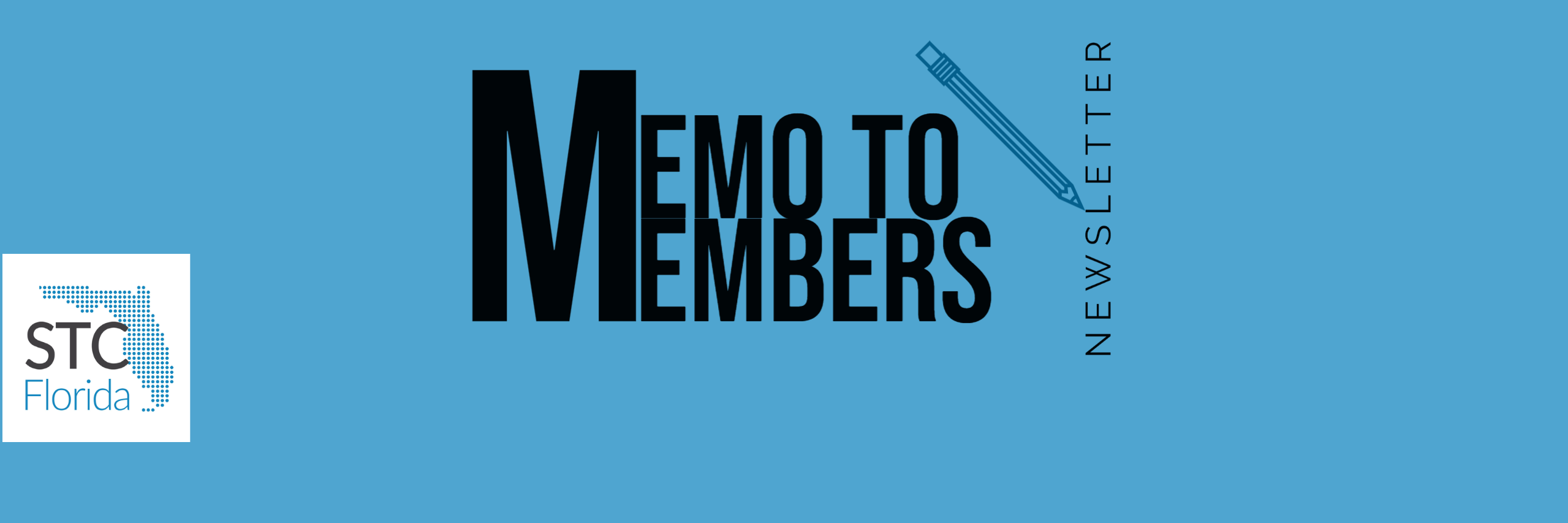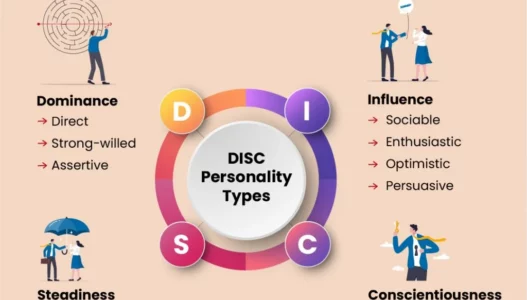By Julia Southwick and Joy Carandang

DISC Types Explained
One’s results are significant indicators in their natural workflows, leadership affinities, communication styles, and conflict-resolution tendencies. There is no such thing as being one style; rather, we are all a blend of more than one. Your DiSC personality type is not indicative of whether or not you are an effective leader. We all have the capacity to lead, and DiSC simply identifies how you innately communicate and motivate others within a group. If you are looking for ways to self-improve or increase your soft skills, look no further, as this may very well be the perfect assessment for you.
Take the Disc Assessment personality test today for free through Truity.
The DISC theory describes personality through four central traits:
- Dominance: A person primarily in this DiSC quadrant places emphasis on accomplishing results and “seeing the big picture.” They are confident, sometimes blunt, outspoken, and demanding.
As project-driven people, they are individuals who ask when to get things done, moving onto the next items on their list fairly quickly. - influence: A person in this DiSC quadrant places emphasis on influencing or persuading others. They tend to be enthusiastic, optimistic, open, trusting, and energetic. Although not the most organized at times, these individuals have the drive to motivate others until a project is fully completed.
i types represent those that ask who in the team would be the best fit for taking on specific tasks, finding ways to encourage their colleagues across the planning and production processes. - Steadiness: A person in this DiSC quadrant places emphasis on cooperation, sincerity, loyalty, and dependability. Similarly to i types, S types are incredibly accepting and understanding of others. They tend to have calm, deliberate dispositions and don’t like to be rushed.
These individuals are highly inquisitive, and always pondering the why(s) in each given situation. They take a bit of time to share their creative ideas, but once they have done so, they become a catalyst to countless breakthroughs and insights. - Conscientiousness: A person in this DiSC quadrant places emphasis on quality and accuracy, expertise and competency. They enjoy their independence, demand the details, and often fear being wrong.
Highly focused and project-driven as D types, C individuals tend to ask many questions concerning the how’s throughout planning stages to ensure quality and precision.

Some people don’t have one clear style but are a mix of two primary styles. In each mixed type, the first listed is the primary type and second listed type is the secondary type.
- Dominance/influence: These individuals enjoy spontaneity, as shown by their quick-thinking and creative ideas.
- Dominance/Steadiness: They enjoy working on projects until completion, withstanding the challenges that many come during the planning and development stages. As much as they are determined to build rapport with their colleagues, they have the ability to keep everyone on track.
- Dominance/Conscientiousness: Motivated by a drive to excel in their endeavors, these individuals identify with accuracy as a means to achieve positive end-results.
- influence/Dominance: They can be characterized as free-spirits who prefer to work in non-traditional settings such as remote work, and bring an abundance of innovative insights to any team.
- influence/Steadiness: To keep a harmonious and positive environment for their team, iS’s listen to those around them in the greater effort of helping them succeed.
- influence/Conscientiousness: Articulate and enthusiastic, these individuals harbor the talent to verbalize their ideas and produce them into tangible results.
- Steadiness/Dominance: They are warm and dependable people that take the time to work alongside their colleagues to get the job done.
- Steadiness/influence: As natural leaders, they are able to understand their colleagues’ motivations and which allows everyone around them to work cohesively as a team. At the same time, they are also adept in collaborative settings that offer a mix of independent work.
- Steadiness/Conscientiousness: Structured and logical, these individuals thrive in professions where they can get their work done in an orderly manner. They are incredibly reliable, and are able to get tasks done efficiently.
- Conscientiousness/Dominance: These highly assertive individuals are organized and detail-oriented within the workplace.
- Conscientiousness/influence: Perfectionists at heart, Ci types are both passionate and disciplined in the workplace. Often, they can be seen in front-end and back-end roles to ensure that their work is of the highest quality.
- Conscientiousness/Steadiness: CS personalities work well in workplace settings where routine and responsibility go hand-in-hand. They are naturally shy, and while group projects can present some difficulties, they ultimately do well when they are presented with clear direction.
…But What Does This Have To Do With Tech Comm?
A career in Technical Communication can translate into working in a number of ever-changing industries and fields for various causes that operate within different workflows. Taking the DiSC Styles test can help a budding technical writer, a current technical writer, or an established practitioner who is looking to find themselves in a new industry identify their values and needs within the job market. Additionally, understanding your results can be beneficial in evaluating your modes of productivity and interpersonal skills.
Those interpersonal relationships drive our success on the job. Learning about our DiSC Styles provides a useful language for technical communicators to understand how we interact with others and how we want them to interact with us.
Knowledge about your DiSC Styles and others’ DiSC Styles can be used to connect with teammates, SMEs, and others in our companies and profession. This can provide the tools we need to convince others why tech writers are needed and why some decisions need to be made for our documentation.
Julia: blend Steadiness/Conscientiousness
My DiSC style is a blend of Steadines and Conscientiousness, also called “The Analyst” and “The Peacekeeper” respectively. I see this as using my analytical skills to address a problem tactfully to contribute to a team environment and keep the team on track. I really enjoy being part of a team and being able to help others (a steadiness trait) using logical facts to ensure accuracy (a conscientiousness trait) in products.
Viewing my results for DiSC alongside my results from the other personality tests I’ve taken so far, I realize there are some similarities. My S/C blend is much like the results of my true color being split between blue and green for the same reasons. Blue and steadiness relate to my enneagram type 2w1- kind, caring, compassionate, loyal, helping others, and so on. Green and conscientiousness relate to my MBTI result INTP- logical, fact-oriented, analytical, objectivity, tactfulness, and so on.
Reading the description of my type from this article on Indeed, I can see why I got the results I did. They describe SCs as “logical, pragmatic employees who aim to complete tasks correctly the first time,” as enjoying “making plans, rules, and guidelines” and as “less social” than some of the other types. I definitely agree with them on these points because they are accurate to how I see myself and reaffirm what the other personality tests I’ve taken so far have indicated, just synthesized a little differently. Indeed suggests professions that require high levels of “meticulous, organized work” suits SCs the best as we “are often content with getting [our] work done and are described as even-tempered and reliable.” One such profession they list is copywriting which is adjacent to what I’m actually doing- technical writing!
Joy: Influence
My dominant DISC style is Influence. Upon viewing my results, I immediately identified with the core characteristics of being energetic, open, and trusting in group settings. In my ongoing experience as the Historian and Communications Committee Member at FTC, I truly enjoy collaborating with my peers to achieve common goals as a team. Some of my favorite activities include brainstorming and planning out promotions with fellow leaders and committee members. During these sessions, I try my best to ensure that everyone’s ideas are heard and considered.
Similar to many other individuals whose DISC style leans towards Influence, I believe that I have a lot of room to improve when it comes to objectivity and organization. I tend to become immersed easily in the smaller details of projects, which is common for most who align more with the iS style variation. Overall, I am eager to start prioritizing a more direct approach when it comes to task orientation.
I tend to gravitate towards collaborative situations where everyone’s contributions to the team are equally acknowledged and celebrated. While working within strict deadlines, I try to make sure to let others know how much their efforts are appreciated. I feel the most motivated when there is harmony in team settings.
Taking the DISC Personality Test has opened my eyes to how every team member is integral to the overall workflow of any company and industry at large. This is especially true in the Tech Comm field, as each and every one of us brings forth a set of differing strengths and outlooks which only adds to our projects that become much more thorough and achievable when done in synchrony.
We Want to Hear from You
No test will ever present a complete portrait of who you are, but many people find them useful for self-reflection or as tools to engage with others. We would love to hear from you about your experience with personality tests. Each test you take will give you a different perspective. Let us know what results you have gotten and how you have found that information to be useful or not.

